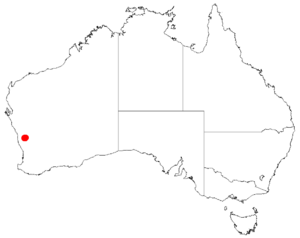Blunt wattle facts for kids
Quick facts for kids Blunt wattle |
|
|---|---|
| Conservation status | |
| Scientific classification |
|
| Kingdom: | Plantae |
| Clade: | Tracheophytes |
| Clade: | Angiosperms |
| Clade: | Eudicots |
| Clade: | Rosids |
| Order: | Fabales |
| Family: | Fabaceae |
| Clade: | Mimosoideae |
| Genus: | Acacia |
| Species: |
A. aprica
|
| Binomial name | |
| Acacia aprica Maslin & A.R.Chapman
|
|
 |
|
| Occurrence data from AVH | |
| Script error: The function "autoWithCaption" does not exist. | |
Script error: No such module "Check for conflicting parameters".
The blunt wattle (also known as Acacia aprica) is a type of shrub. It belongs to a large group of plants called Acacia, which are often called wattles. This plant naturally grows in the Wheatbelt area of Western Australia.
What it Looks Like
The blunt wattle is a shrub that spreads out and can grow from about 0.3 to 2 meters (about 1 to 6.5 feet) tall. It has bright yellow flowers that bloom during June and July. You can find this plant growing in different types of soil, like red loam, sand, or gravel. It often grows on flat plains or rocky hills.
Where it Grows
This wattle species is found in specific parts of Western Australia. It grows in an area known as Beard’s Province: South-West Province. You can also find it in regions called the Avon Wheatbelt and the Geraldton Sandplains.
Why it Needs Our Help
The blunt wattle is a very special plant, but it is also in danger. It is listed as critically endangered under the Wildlife Conservation Act in Western Australia. This means there are very few of these plants left. It is also listed as endangered on the IUCN Red List, which is a worldwide list of plants and animals that need protection.
Most blunt wattles are found along roadsides or in small patches of natural bushland surrounded by farms. This makes them face several threats:
- Road and Firebreak Work: Activities like maintaining roads or creating firebreaks can disturb or damage the plants.
- Chemicals: Sprays like fertilisers and weed killers from nearby farms can drift onto the wattle plants and harm them.
- Weeds: Other plants, called weeds, can grow too close and take away the water and nutrients the blunt wattle needs.
- Fires: Fires that happen too often or at the wrong time can prevent the blunt wattle from growing and reproducing.
 | Madam C. J. Walker |
 | Janet Emerson Bashen |
 | Annie Turnbo Malone |
 | Maggie L. Walker |


